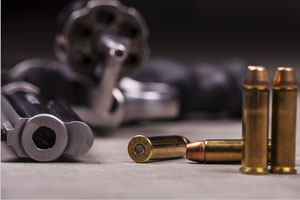In a decision released on January 20, 2016, the Arizona Supreme Court decided that a trial judge erred by refusing to allow a criminal defendant to call an expert in experimental design as a defense witness in a murder trial. That ruling allowed the testimony of the state’s firearms expert to go unchallenged.
The Evidence Against Romero
A man in Tucson died from two gunshot wounds in 2000. There were no witnesses to the shooting. Witnesses did see men leaving the scene in a pickup truck after hearing gunshots, but they could not agree upon the number of men or the make of the truck. Spent .40-caliber shell casings were found at the scene.
A month later, the police stopped Joseph Javier Romero for reasons that were unrelated to the shooting. They found a .40-caliber magazine in his possession. They also discovered a .40-caliber Glock handgun with a missing magazine along the route that Romero had traveled. The police drew the inference that Romero had jettisoned the gun, although they did not see that happen.
Seven years later, a cold case unit inspected a cellphone that was found next to the victim’s body. The phone’s owner told the police that “Joe,” his drug dealer, had borrowed his pickup truck in 2000. A firearms examiner conducted a ballistics test and concluded that the shells found at the scene had been fired from the Glock that the police associated with Romero. Romero was charged with first degree murder. A hung jury resulted in a second trial.
Rulings on Expert Testimony
Before Romero’s second trial started, the defense moved to exclude the testimony of the State’s firearms expert. The State, in turn, moved to exclude the testimony of Romero’s expert. The motions were based on Arizona’s version of the Daubert rule, which requires expert testimony to be based on a reliable methodology.
The trial court reviewed the proposed testimony of both experts. Romero’s expert did not address whether the State’s expert correctly analyzed the markings on the shell casings. Rather, he testified that no analysis of such markings is capable of yielding a reliable result, given the limitations of the experimental methods used by firearms examiners.
The trial court determined that the State’s expert based his conclusion on a reliable methodology and therefore permitted the expert to testify. The court excluded the testimony of the defense expert after concluding that the expert was not qualified to testify as a firearms expert and that submitting his testimony to the jury would invite the jury to second-guess the judge’s pretrial finding that the methodology used by the State’s expert was reliable.
Romero’s Retrial and Appeal
During Romero’s second trial, the State’s expert testified that the marks made on casings found at the scene of the shooting “matched very well” marks made by the gun that the police associated with Romero. The jury acquitted Romero of first degree murder but convicted him of second degree murder.
On appeal, Romero argued that his right to present a defense was violated by the judge’s exclusion of his expert’s testimony. The Arizona Supreme Court agreed.
The trial court and a lower appellate court decided that the defense expert was not qualified to testify, despite his review of applicable scientific literature, because he had never testified as a firearms expert before, had never conducted his own research on firearms identification, and had never tried to identify firearms based on the toolmarks found on expended shells. The state supreme court rejected that argument, noting that the witness’ expertise was not in firearms identification but in experimental design.
The court noted that the defense was not required to offer testimony from the same kind of expert that the state used. Rather, it was entitled to offer expert evidence that would help the jury decide the case. The defense expert would have helped the jury understand that the scientific methodology used by firearms experts differs in significant ways from methodologies that are routinely adopted by other scientists. Unlike other scientists, firearms experts do not follow standardized protocols that permit independent verification by other examiners. In addition, firearms identification relies on subjective assessments rather than an objective assessment based on a comparison of test subjects to control subjects.
The defense expert would have testified that the methodology used by firearms experts falls short of the scientific standards for experimental design, and that those flawed design standards undercut the reliability of the results the experts reach. That testimony would have helped the jury evaluate the evidence offered by the State’s firearms expert. The testimony was therefore admissible under Daubert’s “helpfulness” standard.
The defense expert had a Ph.D. in experimental psychology from Stanford and taught experimental design at Yale and other universities. He makes a profession of analyzing scientific methods. His careful study of the experimental methods used by firearms experts qualified him to render expert opinions about the validity of those methods.
Since the expert was qualified to give opinions that would have assisted the jury in evaluating the state’s evidence, the supreme court concluded that he should have been allowed to testify. The trial judge misunderstood his role when he ruled that the defense expert should not be allowed to undermine his determination that the State’s expert’s methodology was reliable. The judge’s assessment permits the jury to hear an expert’s testimony, but it does not require the jury to believe the expert. Evaluating expert testimony, once it has been admitted into evidence, is the function of the jury, not the judge.




